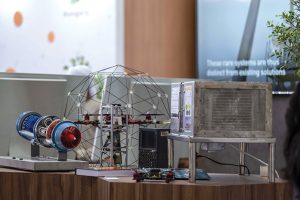DUBAI / WAM
The 28th Conference of the Parties (COP28) provides a platform for universities and educational institutions to present their research contributions and innovations in climate action.
The following report details the projects and innovations executed by research teams at Khalifa University. The university plays a prominent role in driving and accelerating innovation, boasting distinguished academic programmes, advanced research facilities and registering more than 280 patents, with 60% representing new discoveries and sustainable technologies.
The university recently included 54 patents in various fields, including advanced materials, manufacturing, clean and renewable energy, environmental exploration and production, robotics, smart systems, data science, sensors, water, and the environment. These projects showcased at COP28 include a cutting-edge project aimed at advancing concentrated solar power stations. This innovation opens avenues for commercial development, ushering in a new era of more efficient and sustainable solar energy utilisation.
Also, the university presented software leveraging artificial intelligence to enhance power system stability. This software is a vital tool for assessing, predicting, and improving the stability of power grids, contributing to a seamless integration of renewable energy sources. Addressing water treatment challenges, Khalifa University showcases a project utilising two-dimensional materials. This initiative focuses on developing advanced water treatment solutions using functional nanoscale graphene membranes.
The university also displays another project contributing to sustainable water production without energy requirements and zero emissions. Khalifa University’s research teams designed, integrated, and tested a hybrid electric propulsion system. This project aims to optimise air transport vehicles by combining the strengths of internal combustion engines and electric propulsion.
 The Gulf Time Newspaper One of the finest business newspapers in the UAE brought to you by our professional writers and editors.
The Gulf Time Newspaper One of the finest business newspapers in the UAE brought to you by our professional writers and editors.
